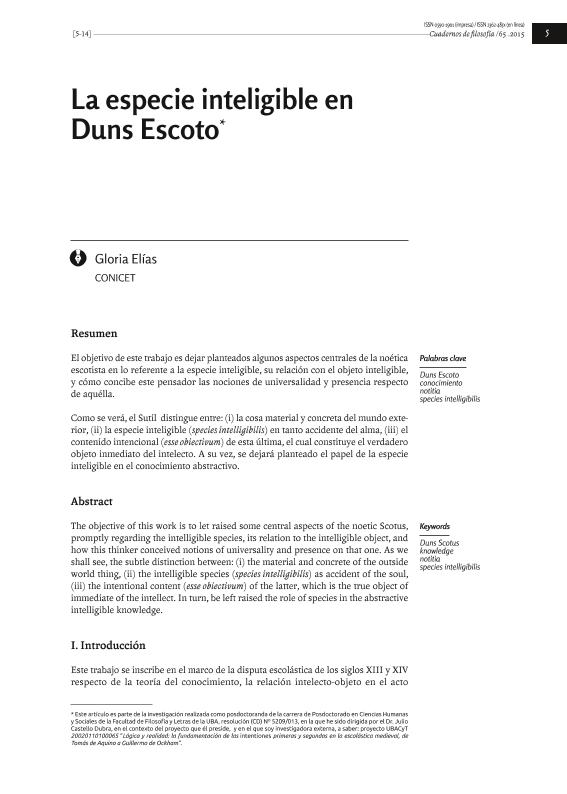Artículo
El objetivo de este trabajo es dejar planteados algunos aspectos centrales de la noética escotista en lo referente a la especie inteligible, su relación con el objeto inteligible, y cómo concibe este pensador las nociones de universalidad y presencia respecto de aquélla. Como se verá, el Sutil distingue entre: (i) la cosa material y concreta del mundo exterior, (ii) la especie inteligible (species intelligibilis) en tanto accidente del alma, (iii) el contenido intencional (esse obiectivum) de esta última, el cual constituye el verdadero objeto inmediato del intelecto. A su vez, se dejará planteado el papel de la especie inteligible en el conocimiento abstractivo. The objective of this work is to let raised some central aspects of the noetic Scotus, promptly regarding the intelligible species, its relation to the intelligible object, and how this thinker conceived notions of universality and presence on that one. As we shall see, the subtle distinction between: (i) the material and concrete of the outside world thing, (ii) the intelligible species (species intelligibilis) as accident of the soul, (iii) the intentional content (esse obiectivum) of the latter, which is the true object of immediate of the intellect. In turn, be left raised the role of species in the abstractive intelligible knowledge.
La especie inteligible en Duns Escoto
Fecha de publicación:
04/2015
Editorial:
Universidad de Buenos Aires. Facultad de Filosofía y Letras
Revista:
Cuadernos de Filosofía
ISSN:
0590-1901
e-ISSN:
2362-485X
Idioma:
Español
Tipo de recurso:
Artículo publicado
Clasificación temática:
Resumen
Palabras clave:
Duns Escoto
,
Conocimiento
,
Notitia
,
Specie Intelligibilis
Archivos asociados
Licencia
Identificadores
Colecciones
Articulos(UE-CISOR)
Articulos de UNIDAD EJECUTORA EN CIENCIAS SOCIALES REGIONALES Y HUMANIDADES
Articulos de UNIDAD EJECUTORA EN CIENCIAS SOCIALES REGIONALES Y HUMANIDADES
Citación
Elías, Gloria Silvana; La especie inteligible en Duns Escoto; Universidad de Buenos Aires. Facultad de Filosofía y Letras; Cuadernos de Filosofía; 65; 4-2015; 5-14
Compartir




